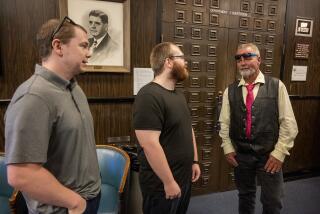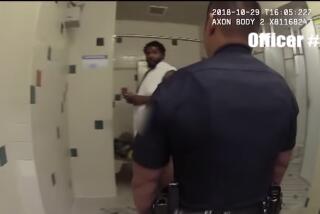Man wrongly convicted can sue LAPD, federal court panel rules
- Share via
A Los Angeles man who spent 19 years in prison for murders he did not commit will be able to sue the LAPD, a panel of the 9th Circuit U.S. Court of Appeals ruled Monday.
Harold C. Hall should be permitted to amend his complaint against the city to allege that officers coerced his confession, which the court said was made as a result of “desperation, fear and fatigue,” in possible violation of the 5th Amendment.
The majority in the 2-1 decision said “the extraordinary circumstances” of Hall’s conviction justified the court’s unusual action “to prevent a woefully unjust result.”
Hall’s double-murder conviction in 1985 was based on “falsified” documents by a jailhouse informant and a confession Hall made when he was 18, the court said. He agreed to admit guilt only after several hours of interrogation in which he was handcuffed, denied food and never advised of his rights, the court said.
The 9th Circuit eventually overturned Hall’s convictions, and prosecutors declined to retry him. He was released in 2004.
Hall later sued the city but failed to allege violation of the 5th Amendment, which protects people from forced self-incrimination. A district judge dismissed the case, ruling that Hall could not amend his suit to cite the proper provision of law.
The 9th Circuit majority said the “exceptional” nature of Hall’s history warranted the court’s decision to revive the lawsuit.
“Justice eluded Hall when he suffered a conviction based on that confession and the patently false inculpatory evidence created by a jailhouse informant,” wrote Judge Dorothy W. Nelson, an appointee of President Carter.
“Justice eluded Hall when he served nineteen years in state prison for a crime he did not commit. And justice will elude Hall yet again without the opportunity to amend his complaint and let a jury decide whether he deserves monetary compensation for his unlawful incarceration.”
Judge Sandra S. Ikuta, appointed by former President George W. Bush, dissented, arguing that the majority’s action was not supported by precedent or the Constitution. Because Hall failed to appeal the lower court’s decision denying him the right to amend his lawsuit, the majority had no authority to step in and overturn the district court, Ikuta said.
Now 46, Hall works full time for the Los Angeles County Bar Assn., coordinating a program that provides lawyers for indigent defendants. He said in an interview Monday that he was grateful to the court and wanted to thank God, his lawyers and his community for helping him win his freedom and bring the case before a civil jury.
“I spent 19 years in prison for something I did not do, and I deserve, as any other inmate who is found to be innocent, to be compensated,” Hall said. “We cannot get our life back. We can never get what they have taken away from us.”
The killers of Nola Duncan and David Rainey, the victims he was charged with murdering, “are still out there,” Hall said.
The 9th Circuit, summarizing his story, observed: “Some might call Hall an unlucky fellow.”
Hall had lived near the murder scene. “The close proximity of his home to where the police found Duncan’s body appears to be Hall’s only connection, if one could call it that, to the crime,” Nelson wrote.
After the murders, Hall was arrested on suspicion of committing an unrelated robbery, to which he pleaded guilty, and was placed in a cell near an informant.
That inmate told the LAPD that Hall had admitted to the double murder, and detectives then interrogated Hall. Prosecutors sought the death penalty, but a jury recommended Hall be sentenced to life without possibility of parole.
Deputy Los Angeles City Atty. Lisa Berger said the city is reviewing its options, which include a request that the court reconsider the case.
More to Read
Sign up for Essential California
The most important California stories and recommendations in your inbox every morning.
You may occasionally receive promotional content from the Los Angeles Times.











